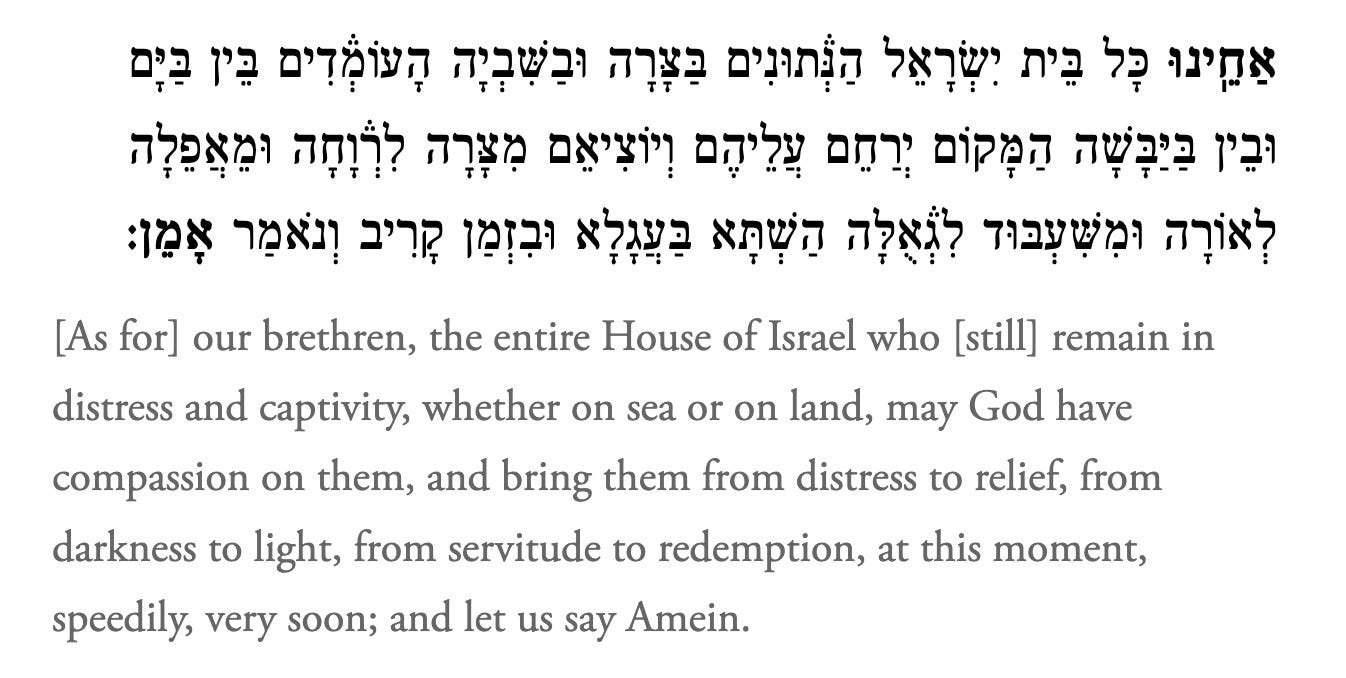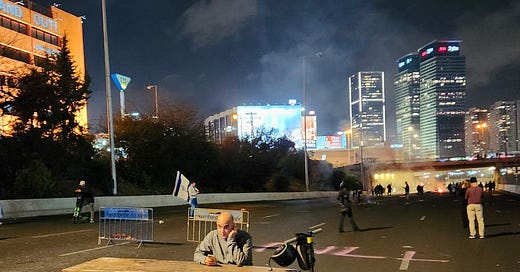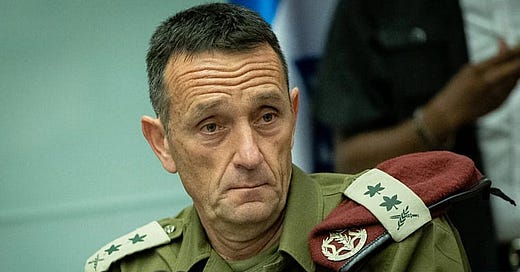

Discover more from Israel from the Inside with Daniel Gordis
How did we get here, and more importantly, how are we going to get out?
As we approach Tisha B'Av, it's worth noting: even after October 7, we had no idea of the depth of the crisis that was just beginning to unfold.
Checking in to our El Al flight from LAX to TLV on Sunday was a subdued affair. The plane, not surprisingly (given that there are many thousands of Israelis anxious to return home who cannot get flights) was entirely full, but it wasn’t the normal zoo. People lined up, answered the security questions, and waited to board… hoping that the flight that would take them into what might soon become a war zone would actually take off.
That’s the thing about Israelis—when the going gets tough, we come home.
That’s fine, as far as it goes, but the “normalcy” at the check-in line actually worried me. Have we actually gotten used to thinking that it’s “normal” that a country has to gird for an attack from another sovereign state sworn on its destruction—a likely second attack in less than four months?
The woman from security who asked all those “Who packed your bags?” questions started with “How are you?”
“Everything’s fine,” I said, “except for what’s not.”
She looked at me quizzically. “What’s not OK?”
I just looked back at her, as if to say, what in the world do you mean, what’s not ok?
“Oh,” she said. “That? We’re used to that already.”
I didn’t find that complacency in the least bit comforting. In fact, it worried me. Does she understand how problematic it is that we’ve gotten used to this, how much it reflects the new Israeli take on the world, which is, essentially, “Well, yes, they can attack us, but other than try to shoot their stuff out of the sky, there’s not much we can really do about it.”
She doesn’t realize that what we’re living is outrageous?
That is not how we thought about Israel on October 6. That is not how we thought about Israel even a few months after October 7. Remember that phrase that used to be on the top of every web site, every ad, every newspaper: Be-yachad nenatze’ach: “Together, we’re going to win”?
It’s become sort of quaint these days, that phrase. Refer to it, and people kind of smile. “Yeah, I remember the days when we actually thought that.”
This new Israel, the Israel hunkered down waiting for Iran to attack us once again, is a very different country from the “little engine that could” Israel that many of us fell in love with years ago. Is this Israel—the Israel that can be attacked at will by foreign countries, leaving the Jewish state entirely dependent on the US President (whoever she or he may be at the moment) to put together a coalition of countries to defend it—the kind of Israel our kids’ generation is going to keep flocking back to?
One would have to be very naive not to be worried about that.
So the attack will come, or it won’t. It’ll be big (which I doubt) or token (my guess) or somewhere in the middle. It’ll either lead to all out war (which I doubt, because the US doesn’t want it to) or regional skirmish (also unlikely, I suspect) or much ado about very little, but still—there’s an entire country sitting here waiting to be attacked, and no one seems to think that’s crazy. The mere fact that life goes on—the stores are full, the cafes are packed, my wife and I are about to head out for dinner—is what’s absurd.
We’re so jaded that unlike last time, we haven’t done very much to get ready for this barrage. That could be a bad miscalculation on our part, but it’s hard to get all worked up about this the second time. Yes, we plugged in the generator to top it off when we got home. But no, we didn’t restock the safe room with food and water—I assume there’s enough there for a few days, but I didn’t check. We didn’t load up the safe room with phone chargers and laptop cords or any of that. It’ll be what it’ll be. We’ll deal.
Here’s what worries me, much more than whatever attack is or isn’t on it way: Do we Israelis still get how not normal this is? Do we get how much things have changed in this country? Do we understand how this is no longer the Israel of a year ago?
True, we didn’t stock the safe room when we got home, but we did turn on the news. The regular talking heads were all in the middle of a conversation about something, when one of the panelists sought to remind everyone of how different everything has become.
“We were brought up believing that we were a military power,” she said. “But then we realized that we’re not. So we told ourselves that at least we’re a regional power. But how true is that?” After all, she went on, Hamas isn’t nearly destroyed (see CNN analysis of this), we’re terrified of going to war with Hezbollah, Iran is pulling all the strings that it wants to and we?—we watch, hoping that the President of the United States can pull together another coalition to protect us.
But what happens when it’s not this President? What happens when even this President gets tired of being “bullshitted” by our Prime Minister, as he himself put it?
Seemingly apologizing to Biden on behalf of many Israelis, and likely mortified by how Netanyahu has continued to toy with Biden, Oded Ben-Ami, one of Israel’s leading newscasters, went off script yesterday afternoon and shared this message with the President (his words were posted by his colleague, Yonit Levi, on X).
The message, of course, was not only to Biden—it was to Israelis at large. Ben-Ami wants us to acknowledge how desperately dependent we are on the US, how grateful we ought to be to President Biden for all he’s done, and how aware we ought to be that we only have a few months before it’s a very different President.
Calendar thoughts:
Yesterday, Monday, was the first day of the month of Av, which marks an intensification of the mourning period observed by traditional Jews as Tisha B’Av, the ninth of Av (next Tuesday) grows closer.
I’ll confess that this year, the traditional Jewish calendar—beginning with the day commemorating the surrounding of Jerusalem’s walls (a few months ago), to the breeching of the walls (a couple of weeks ago), to the beginning of Av (yesterday) and ultimately to utter destruction (next week)—feels different to me. The question that I keep asking myself this year that I don’t think I’ve ever asked myself before is “at what point did those Jews back then fully understand that it was over, that they were going down?”
When did they realize that they’d passed the point of no return? Was it right at the very end? Or a bit before? How much before?
And before that, was there anything they could have done differently to save themselves? Would it have mattered had they had better leadership?
When it all began to fall apart, could they even remember how it all began?
Would any of us have believed, on October 8, that more than 300 days into this war, we’d still have 151 hostages (dead and alive) that we’re unable to rescue, that Hamas would still be firing rockets into Israel, that the north would be empty of citizens with no timeline for their being able to go home, that Iran would have attacked Israel once and would announce that it was about to again and it was only because of the President of the United States that Israelis weren’t terrified, that we’d be within sixty days of the one year mark and we’d have precisely the same political and military leadership that got us into this mess?
Who would have believed that?
It’s been a long time since October 7. And a great deal has changed. Now that the ANU Museum has made public its collection of professional photographic stills (and one brief video) that it’s showing at the museum, it’s worth using that to give meaning and moment to this time in the Jewish calendar.
The collection of photos is just below. It runs 22 minutes, with nothing gory. You’ve likely seen many of the images before, but it’s worth watching them again. So find a quiet place to watch, to listen, to remember, to be shocked and horrified all over again.
Take the time to remember, now that we’ve forgotten, how naive we were. To be reminded, given what we’ve become used to, how much more dire things are now than they were then, when we thought that the very worst had happened.
Why focus on all that? It’s worth remembering all that because it’s not yet too late.
We can still save this country. It will take many years, great patience, profound wisdom, better leadership and a lot of luck. We’d have to do some things—many, many things, actually—dramatically differently. Are we still a people with the spine to make that happen? Do we have the discipline? The vision? The belief in ourselves?
For a while it sounded like we did. Now, it’s not so clear. Which is why now is the time to remind ourselves to do what our forebears did—to dream and to build.
That is why we Jews take time to remember, why our calendar has no holidays centered around the lifetime of a person, but only dates focused on our people as a whole.
Because back then, at a certain point, it was, indeed, too late. Today, it’s not.
And the question that needs to consume us is: What do we need to do to ensure that it never is?
















“We were brought up believing that we were a military power,” she said. “But then we realized that we’re not."
Israel is very much a military power. But the problem is that thanks to quite a few factors, including the increasingly problematic relationship with the American Democratic Party which has become a party of apeasement and therefore permanent war and threat, Israel is unable to use its full military power and Iran knows this.
I disagree with your statement, Doug. Every US Administration would be cautious in the Middle East as it has been and continues to be a power keg. This area has a long history of colonialism from major European powers. This is also the source of the military coalition. Beyond that, despite the Abraham Accords, there is the history of the history of the Arab League. One never steps lightly into Middle Eastern conflicts which are more complicated than that proverbial pealing an onion.